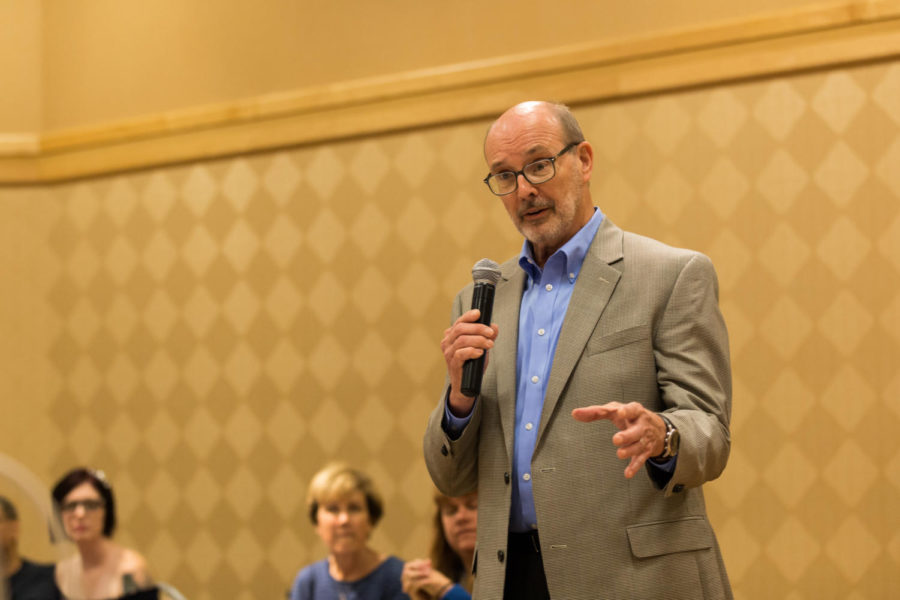Story County program celebrates 25 years of helping children in foster care
June 14, 2018
Thousands of children are subject to abuse in the U.S. every year. With social workers and foster homes being overloaded with kids to take in, volunteer programs are looking for a solution.
The Court Appointed Special Advocate Program, or CASA, helps Story County youth who have been abused or neglected. Celebrating its 25th year of service in Story County, the program is looking to branch out and take in new volunteers.
According to the CASA program, “Story County had over 120 abused and neglected children under juvenile court supervision, either in their homes or in an alternate placement. Only a small number of those children had the benefit of a Court Appointed Special Advocate.”
Children with a CASA advocate were half as likely to re-enter foster care and more likely to be adopted or return to a permanent residence.
While CASA has been active in the U.S. since 1977, administrator for the CASA Board Jim Hennessey says Story County has had CASA for the past 25 years.
“Our goal is to get 25 new CASA advocates signed up in celebration of our 25th anniversary,” Hennessey said.
These advocates learn how to help children see a way to a better life while getting trainings in child welfare and development.
CASA advocates can be from any background said Theresa Barnes, the CASA coordinator for Story County.
“You don’t need special skills to be a CASA,” Barnes said. “We will teach you the skills to be an effective CASA advocate. You just need a love for children.”
Once a CASA has gotten the training needed, they can be appointed by a court to pay attention to a family, typically one at a time.
According to the program, the advocate serves as an extra set of eyes and ears for the judge. Advocates create a comprehensive picture of a child’s life to the court, as well as provide recommendations to the court about the child’s living situations.
“There are currently 6,000 children in Iowa in the child welfare system and right now we can only serve about 15 percent of those,” Hennessey said.
Of the 130 children in the child welfare system in Story County, Hennessey says 23 are being served by CASA’s.
Kaisa Neal, a former CASA youth, talked about her experiences with childhood abuse and her journey through the foster care system.
“I started to crack and break and cause outbursts,” Neal said about her experiences as a child.
Through multiple foster homes and government systems, Neal eventually got put back with her mom, but later her “own bad decision sent her back to [juvenile detention] and another foster home.”
“Drinking alcohol and smoking weed became regular habits for me,” Neal said.
It wasn’t until programs and people who cared for her like CASA, AMP (achieving maximum potential), her judge, her parole officer and her mother came into her life when she started to move in a positive direction.
“Now I am a wife with two kids and a CASA advocate myself,” Neal said.
Being a CASA advocate, she says, has changed her life.
“I love this job,” Neal said. “I can give back. I can make a difference in someone else’s life. I can share my story.”
Others, like guardian ad litem Shannon Leighty, gave their reasons for supporting the CASA program.
“I really like the CASA program,” Leighty said. “The CASA’s are the wildcard in the room. As a CASA, you don’t have the restrictions and laws to follow of a DHS worker or attorney. You can think outside the box and make recommendations for what you think is best for a child’s life.”
Leighty said this unique perspective can be valuable to judges and attorneys when making decisions about a child’s life, but the job is not easy.
“As a CASA, it can be hard to balance your responsibilities to uphold family communication and communication with a judge,” Leighty said. “Sometimes I have to recommend children to go to homes I wouldn’t send one of my own children to.”
Despite this, Leighty says it is worth it.
“You really do make a difference,” Leighty said. “You aren’t always mentioned in the courtroom but we listen to everything you say and do.”
CASA advocate and coach Jim Hessenius agreed with Leighty, saying it has been worth it for him.
“I have a couple of cases on my own,” Hessenius said. “It can be very rewarding. You are leading them down a path to help kids. When I meet a family I tell the parents that I am here to protect the kids. The kids are my primary goal, to make sure they are safe and in a home where they feel safe and loved.
“You can make a difference in a kids life and a lot of kids over a period of time.”
Hessenius said as they are given a court order, they are allowed to go where the kids go, get records and do interviews with anyone who interacts with the kids.
“If you can turn a dark side to a bright side you can make a huge difference in a kids life,” Hessenius said.
For more information on how to become a CASA advocate or learn more about the program, visit the Iowa Childhood Advocacy Board’s website.
















